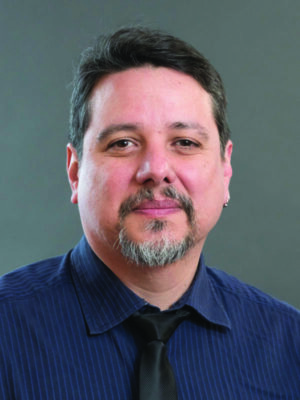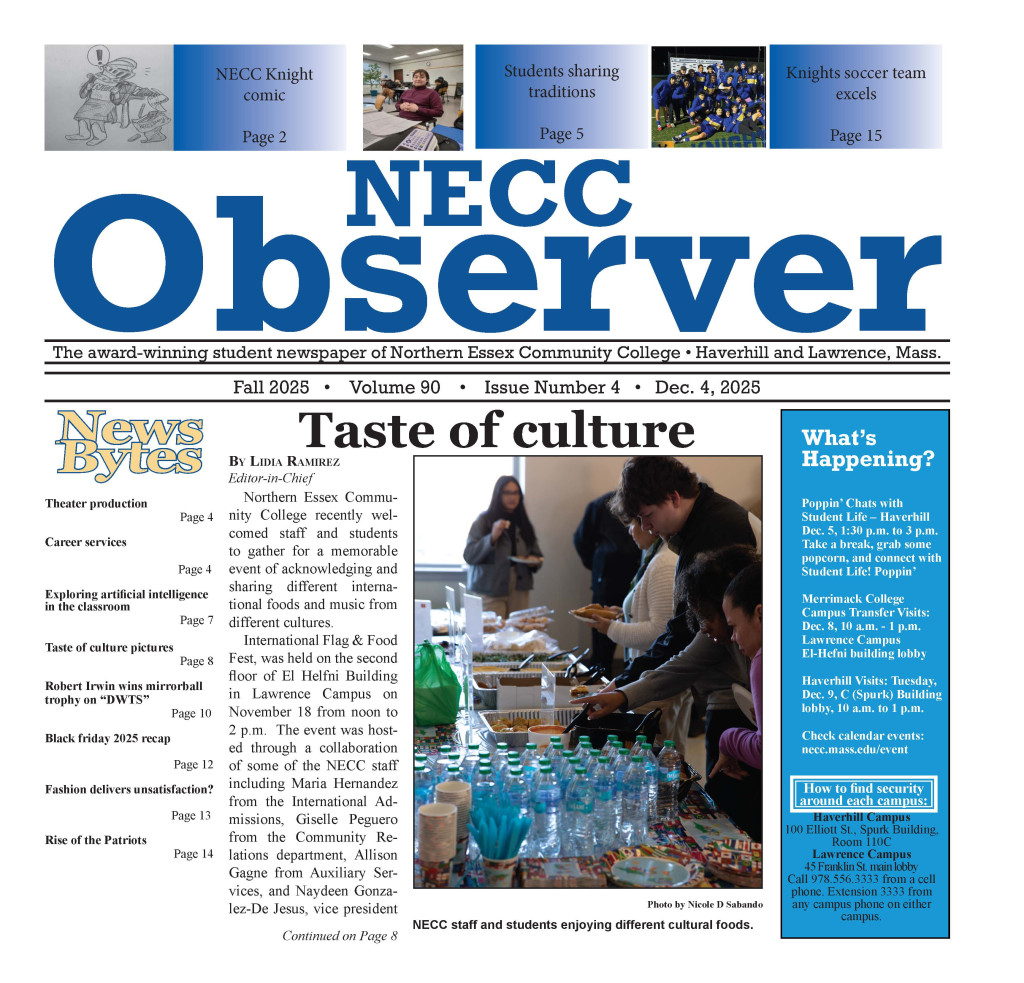
Fifty-four-year-old Thomas Greene is the chair of the NECC English department and professor as well as a short-story writer, gamer and vampire history fanatic.
Greene also has an established a lengthy academic profile. Greene first obtained a bachelor’s degree from Trinity college in San Antonio
“My undergraduate school was a small liberal arts college…in my hometown..where I graduated with a BA in English and a teacher certification for high school English and History,” said Greene.
He went onto to earn a master’s of fine arts and a Ph.D. in creative writing and British literature from Umass Amherst. “UMass offered me money, so I moved to Amherst and earned an MFA in Fiction Writing from Umass Amherst, followed by a Ph.D. in British Literature, also from Umass Amherst. The MFA only took about 3 years, but the Ph.D. took 9 years, which was about average for my program at the time.” Greene said.
He describes the most difficult part of obtaining his degrees: “The most difficult part of my education was learning to understand what a Ph.D. dissertation was, and how it should be written. Because I went straight from undergraduate school, I was only about 25 when I enrolled as a Ph.D. student, so it took me many years — while I was also taking classes — to understand what the dissertation was supposed to be and what the standards and expectations were.”
Teaching hasn’t always been Greene’s profession, prior to teaching he had been a technical writer for a computer company
“While I was at UMass, I did the coursework necessary to earn a certificate in professional writing and technical communication in the program that was just taking off there. As part of the program, I worked a summer as a technical writer at Digital Equipment Corporation in Littleton, MA, and then they asked me to come back the following year (which was the last year before I graduated). That certificate and experience was enough to land me my first professional writing job at Kaplan Test Prep in New York, as well as qualifying me for short-term contracts for companies like Compaq, Oracle, Bedford-St. Martins Press, and some nonprofits associated,” he said.
After graduating with a Ph.D in 2001 from UMass Greene had soon moved to Brooklyn with his wife and worked for Kaplan Test Prep for about 18 months. After he taught at CUNY Kingsborough Community College. Greene lived in Brooklyn for about five years, from ‘03-‘07.
When asked. how it was to teach in New York post 9/11 Greene said “New York is a great place to work or study when you’re young, and there are some die-hard people who live there and make it work. But my wife and I were examples of a really widespread population of people who move to New York, live and work there for about 5 or 6 years, and then move away. The impossibility of ordinary people being able to own property there, and the inconvenience and chaos of living in a crowded city just isn’t doable, I think, for most people who aren’t actually from there. I go back and visit sometimes, and I enjoy it, and I’m glad I lived there, but I don’t want to go back,” he said. “When I lived there, the city was still recovering from 9/11 and a lot of the people I met had firsthand memories. Heard a lot of stories about people’s kids who had been traumatized. Also, every time you went to a stand-up comedy club or fiction reading, the stories were all about 9/11. I feel like it was the city processing the trauma, so that now it’s still remembered, but not as directly or as emotionally as it was back then.”
Greene eventually joined NECC in 2008 and settled into a small 19th century home inSalem, with his wife.
Teaching seems to be something that runs in his blood, when asked what brought him to teaching and what he likes about it,
Greene says, “My parents were public school teachers, and they always told me and my sister, ‘You can do whatever you want with your life, but don’t be a teacher,” he said. “My sister recently retired from her career as a math professor. But seriously, I always just liked explaining things and answering questions, so this is a job where I get paid to do what I enjoy. And also, even though the pay isn’t anywhere near what technical writers make, it’s a career where I can feel — at the end of each day — like maybe I’ve done something worthwhile that might make the world a little better.”
Writing is another passion of Greene’s. After submitting stories tregularly for decades, a magazine accepted and published his science-fiction, short story “Another Man’s Treasure,” in the May 2014 issue. Analog Science Fiction and Fact Magazine is the longest continuously published science fiction magazine in the country, and is considered one of the most influential in the field. It is one of only a handful of speculative fiction digests that still publishes print editions, with a circulation of about 27,000.
“Another Man’s Treasure” is a science fiction story set in a dystopian America of the near future.
The story is about Maggie Moreno, a widow and single mother who scratches out a living as a prospector in an abandoned 20th century mega-landfill. When the local thugs pressure her to risk her life to bring in better salvage, she’s forced to resort to desperate measures to save herself and her children.
“It’s a huge sense of validation when a magazine buys a story. Especially when you’ve spent (as I did) 27 years trying unsuccessfully to get published, with no particular feedback most of the time from the magazines rejecting your stories, it can be tough to keep going. So now, even though my stories are accepted more often than they’re rejected, it’s still as joyful and validating as that first successful piece was,” he said. “
Greene says “I wouldn’t call myself a novelist, because I’m still trying to make the transition from writing short stories to writing novels. Like with the dissertation, for me the hard part is to understand the scale and scope of a novel, as well as to get a clear idea of what readers are getting from what I’m writing.My first attempt at a novel I wrote for a contest when I was 16. It was bad, I didn’t win, and I don’t hardly consider that this attempt counts. My second attempt was when NECC gave me a sabbatical to draft a novel back around 2014. That novel got some interest from literary agents, but I hadn’t done a good enough job of creating the protagonist vividly, so that novel failed to sell. So far, my failed novel and all my published work is hard science fiction — that is, SF that has no fantasy or imaginary elements involved. But I have ideas for fantasy stories and more “soft” sf stories that I might get to in the future. I collect all my ideas in files that I store on the cloud and come back to them when I need something new to write. My process is that I try to write or revise something every day. Sometimes I miss a day or two, but writing even a little bit every day keeps me on track, and those little blocks of time really add up.”
When asked if he is actively writing he said “Right now I’m revising a draft of a novel I wrote during the lockdowns, a prequel to a novelette that I published in Analog magazine a few years ago. This time, I’m working with an online writers group of other pro and semi-pro writers, meeting monthly and getting feedback on each chapter as we go. I hope this will help me stay on track with what readers are getting from my novel, and I hope it will work out this time.”
“What is your fascination with the supernatural and what makes it easier to write it for you?” asks the reporter Greene replies
“For me, the supernatural in fiction is a metaphor for something in life that is otherwise difficult to describe. For example, a haunted house is a metaphor for a troubled family. A dragon is a metaphor for the greed and selfishness that all people experience sometimes. The metaphor is a lens that allows you to understand the thing it’s describing in a new way — in a way that you couldn’t understand it if it weren’t described by that metaphor, because the metaphor creates distance, emotionally, that entices you to allow the truth past your psychological defenses.I believe that I am drawn to supernatural fiction, fantasy, and folk tales because, as a person of mixed race, I always feel like an outsider to some extent. I’ve never had the experience of completely ‘belonging’ with a group of same-race people in that way. But this experience is really difficult to describe in real-world terms — and most people who have only a single race aren’t even aware of any issues around it. So supernatural and fantasy fiction gives me both a way to feel a sense of belonging, and a set of tools to express my experience in a way that might be understandable to others.”
Lastly is a fun fact about vampire history that Greene would like to share: “One fun fact about the original Dracula story that most people don’t know is that he’s not destroyed by sunlight. In the novel there are scenes of him walking around London in daylight with no problem. The whole thing about bursting into flame was added later by Hollywood — I suspect because fire looks cool on film. But my idea about vampires is that they represent particular fears that modern, urbanized, industrialized city-dwellers have that result from the way that we have to live around strangers (which is unprecedented in most of human history) and that therefore we need to trust that these strangers aren’t sometimes actually undead monsters, lurking around, waiting to drink our blood.”

